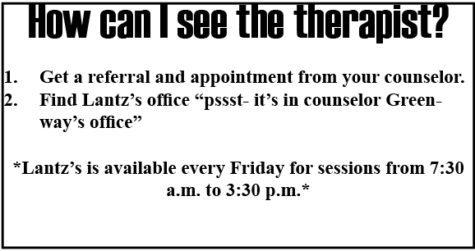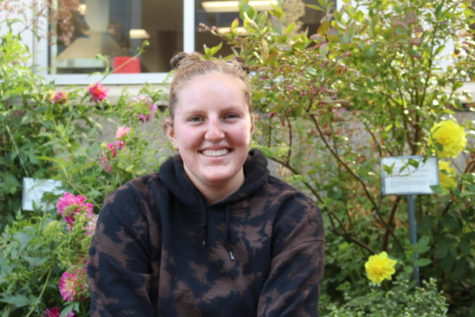Sessions With Sarah
Mental health therapist Sarah Lantz shares her hopes for students, what sessions look like and how to get them, and why she is here this year.
December 7, 2021
Studies have found that 17 percent of high schoolers have self-harmed, while 16 percent have considered suicide, but having a therapist to talk to can help reduce feelings of helplessnes and sadness.
On Fridays in the counseling office, mental health therapist Sarah Lantz from Ryther, a local mental health organization, has sessions with students before, during, and after school hours.
Ryther offers counseling, therapy, and substance use assessments in the Seattle area. Ryther’s partnership with Shorewood started last year with online teletherapy sessions, however most students were probably not aware of this due to Covid. With school back in person, sessions are offered in person too on Fridays.
Students can choose to do teletherapy sessions if that is what they’re more comfortable with, but Lantz is here this year to help break down barriers for students who may need mental health support in person.
“Getting transportation to our clinic could be a barrier and offering therapy services directly at school reduces that barrier,” Lantz said.
Lantz is in Counselor Shannon Greenway’s office every Friday for sessions. However, if there is a need for more services, Shorewood’s partnership with Ryther allows Ryther to send more therapists as needed. Students can also schedule with Lantz outside of the hours she is at Shorewood, as she is only here Fridays from 7:30 a.m. to 3:30 p.m.
To schedule sessions, students must first talk to their counselors who will schedule a meet and greet with Lantz. If you decide you would like to see Lantz for therapy, you must get a referral from your counselor that they will send to Ryther. Finally, you’ll be scheduled for an intake session. According to Lantz, Ryther has been slow to schedule clients, so students should be prepared to wait up to even a few weeks before getting appointments. “I’ve just started to get clients on my caseload,” Lantz said.
Students’ sessions will be paid for by their insurance. Studentsneed insurance to see Lantz, but Medicaid is accepted for students who require financial assistance. Some options for students who do not have insurance are seeing private therapists who may

accept payment out of pocket or by using WA Health Plan Finder. “There is Medicaid/Apple health as an option through WA Health Plan Finder, depending on factors like the family’s income and if the parent/guardian’s employer offers health insurance as part of benefits,” Lantz said.
Confidentiality is something that Lantz values, as she wants her clients to feel comfortable. “If a client is 13 or older, I cannot share any information regarding the client’s mental health treatment with parents/guardians unless the client signs an ROI,” Lantz said. An ROI is a release of information form. If a student chooses to sign an ROI, Lantz will communicate what will be disclosed.
“The only time I am allowed to break confidentiality is if the client discloses an intent and plan to hurt themselves or another individual,” Lantz said.
Lantz is also a mandated reporter, meaning if abuse of a minor is disclosed to her, she is required by law to make a call to Child Protective Services (CPS) or Adult Protective Services (APS). CPS is responsible for the assessment, investigation and intervention regarding cases of child abuse and neglect, including sexual abuse. APS provides services to abused, neglected, or exploited older adults and adults with significant disabilities.
“I work with students specifically on mental health challenges and diagnoses, such as anxiety, depression, and Post Traumatic Stress Disorder (PTSD), and how t
hese challenges are impacting aspects of their lives (academics, social life, family),” Lantz said.
During sessions students will “target specific issues that we want to work on and then come up with a treatment plan to address the issues,” Lantz said. Lantz uses evidence-based practices such as Cognitive Behavioral Therapy (CBT) and Dialectical Behavioral Therapy (DBT) to treat symptoms of specific mental health diagnoses, she said.
Lantz is excited to be here this year, and looks forward to meeting students. “I love meeting people, learning about their lives and interests, and supporting them in solving problems, managing their symptoms, and reaching their goals,” she said.
Her goal for Shorewood is simple: “Help students get mental health care if they want it.”




